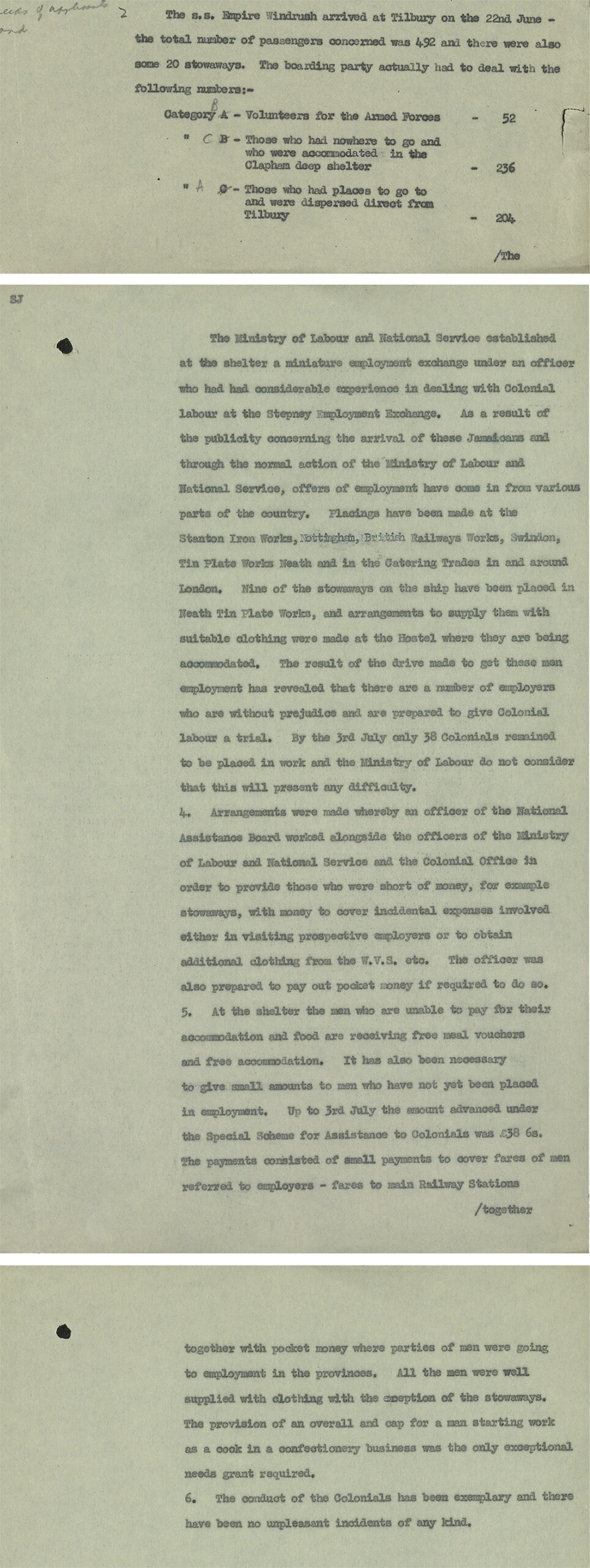
Extracts from Assistance Board Memorandum about arrangements for Windrush arrivals, including information about treatment of stowaways. 1948. Catalogue ref: AST 21/8
- What was the number of passengers?
- How were they grouped into categories?
- What support was given to stowaways?
Transcript
Extract (a)
The s.s. Empire Windrush arrived at Tilbury on 22nd June- the total number of passengers concerned was 492 and there were also 20 stowaways. The boarding party actually had to deal with the following numbers:
Category A- Volunteers for the Armed Forces- 52
Category B- Those who had nowhere to go and who were accommodated in the Clapham deep shelter- 236
Category C- Those who had places to go to and were dispersed direct from Tilbury-
204
Extract (b)
The Ministry of Labour and National Service established at the shelter a miniature employment exchange under an officer who had had considerable experience in dealing with Colonial labour at the Stepney Employment Exchange. As a result of the publicity concerning the arrival of these Jamaicans and through the normal action of the Ministry of Labour and National Service, offers of employment have come in from various parts of the country. Placings have been made at the Stanton Iron Works, Nottingham, British Railways Works, Swindon, Tin Plate Works Neath and in the Catering Trades in and around London. Nine of the stowaways on the ship have been placed in Neath Tin Plate Works, and arrangements to supply them with suitable clothing were made at the Hostel where they are being accommodated. The result of the drive made to get these men employment has revealed that there are a number of employers who without prejudice and are prepared to give Colonial labour a trial. By 3rd July only 38 Colonials remained to be placed in work and the Ministry of Labour do not consider that this will present any difficulty.
- Arrangements were made whereby an officer of the National Assistance Board worked alongside the officers of the Ministry of Labour and National Service and the Colonial Office in order to provide those who were short of money, for example stowaways, with money to cover incidental expenses involved either in visiting prospective employers or to obtain additional clothing from W.V.S. [Women’s Voluntary Service] etc. The officer was also prepared to pay out pocket money if required to do so.
- At the shelter the men who were unable to pay for their accommodation and food are receiving free meal vouchers and free accommodation. It has also been necessary to give small amounts to men who have not been placed in employment. Up to 3rd July the amount advanced under the Special Scheme for Assistance to Colonials was £38, 6 shillings. The payments consisted of small payments to cover fares of men referred to employers- fares to main Railway stations
Extract (c)
together with pocket money where parties of men were going to employment in the provinces. All the men were well supplied with clothing, with the exception of the stowaways. The provision of an overall and cap for a man starting work as a cook in a confectionary business was the only exceptional needs grant required.
- The conduct of the Colonials has been exemplary and there have been no unpleasant incidents of any kind.
